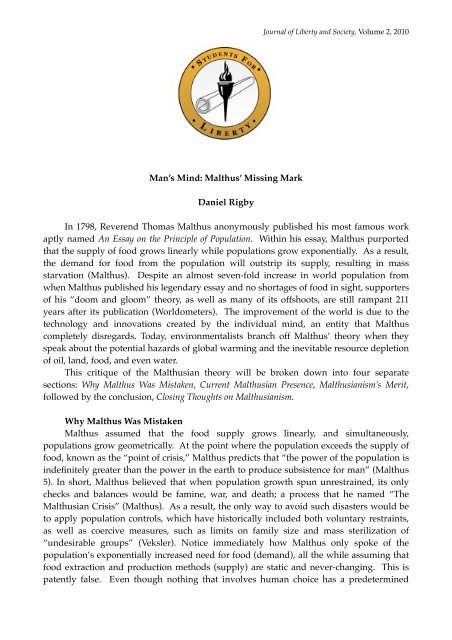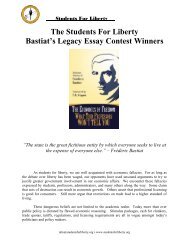Man's Mind: Malthus' Missing Mark - Students For Liberty
Man's Mind: Malthus' Missing Mark - Students For Liberty
Man's Mind: Malthus' Missing Mark - Students For Liberty
Create successful ePaper yourself
Turn your PDF publications into a flip-book with our unique Google optimized e-Paper software.
Journal of <strong>Liberty</strong> and Society, Volume 2, 2010<br />
Man’s <strong>Mind</strong>: Malthus’ <strong>Missing</strong> <strong>Mark</strong><br />
Daniel Rigby<br />
In 1798, Reverend Thomas Malthus anonymously published his most famous work<br />
aptly named An Essay on the Principle of Population. Within his essay, Malthus purported<br />
that the supply of food grows linearly while populations grow exponentially. As a result,<br />
the demand for food from the population will outstrip its supply, resulting in mass<br />
starvation (Malthus). Despite an almost seven-fold increase in world population from<br />
when Malthus published his legendary essay and no shortages of food in sight, supporters<br />
of his “doom and gloom” theory, as well as many of its offshoots, are still rampant 211<br />
years after its publication (Worldometers). The improvement of the world is due to the<br />
technology and innovations created by the individual mind, an entity that Malthus<br />
completely disregards. Today, environmentalists branch off Malthus’ theory when they<br />
speak about the potential hazards of global warming and the inevitable resource depletion<br />
of oil, land, food, and even water.<br />
This critique of the Malthusian theory will be broken down into four separate<br />
sections: Why Malthus Was Mistaken, Current Malthusian Presence, Malthusianism’s Merit,<br />
followed by the conclusion, Closing Thoughts on Malthusianism.<br />
Why Malthus Was Mistaken<br />
Malthus assumed that the food supply grows linearly, and simultaneously,<br />
populations grow geometrically. At the point where the population exceeds the supply of<br />
food, known as the “point of crisis,” Malthus predicts that “the power of the population is<br />
indefinitely greater than the power in the earth to produce subsistence for man” (Malthus<br />
5). In short, Malthus believed that when population growth spun unrestrained, its only<br />
checks and balances would be famine, war, and death; a process that he named “The<br />
Malthusian Crisis” (Malthus). As a result, the only way to avoid such disasters would be<br />
to apply population controls, which have historically included both voluntary restraints,<br />
as well as coercive measures, such as limits on family size and mass sterilization of<br />
“undesirable groups” (Veksler). Notice immediately how Malthus only spoke of the<br />
population’s exponentially increased need for food (demand), all the while assuming that<br />
food extraction and production methods (supply) are static and never-changing. This is<br />
patently false. Even though nothing that involves human choice has a predetermined
Journal of <strong>Liberty</strong> and Society, Volume 2, 2010<br />
growth rate, unconstrained production growth continually and historically has always<br />
outpaced population growth.<br />
One of the many problems with Malthusianism is that it assumes that the resources<br />
humans need are fixed. Malthus’ view is that each marginal individual born requires a<br />
predetermined amount of food, land, water, and other resources to survive. However, this<br />
is not consistent with reality. Individual values are constantly evolving and substitutes for<br />
virtually all goods, services, and resources exist. Because of this, each marginal individual<br />
born not only produces demand for the products of civilization, but also provides new<br />
resources and insight for meeting those needs (Veksler). The concern with Malthus’ theory<br />
is that he only concentrates on the demand side of economic thought, neglecting the<br />
supply side (particularly Say’s law that production creates the ability to demand) and, as a<br />
result, production and human ingenuity. 1<br />
Population growth, typically, is not exponential because the cost of children in<br />
industrialized nations is extremely high. Observe:<br />
The reason for the natural decline in population growth rates is that children are much more<br />
expensive in industrial countries. Increasing productivity levels in the developed world mean<br />
higher standards of living, lower child mortality, and a higher opportunity cost of having children.<br />
Child labor is no longer necessary for families to survive, and children have become expensive in<br />
terms of both direct expenses and lost economic opportunities for parents. (Veksler)<br />
This is because if a man and a woman live in a developed part of a country, they have<br />
no need to birth numerous children in order to plow and irrigate the fields, sow seed, or<br />
partake in other menial farming tasks. When the parents refrain from having children,<br />
they reduce both their explicit costs and, more importantly, their implicit costs. The ability<br />
to decrease the costs related to having children are incentives for not having children and<br />
they do affect individual’s behavior. The parents will save money because they do not<br />
have several children to feed and clothe (explicit costs that reduce population). More<br />
significantly, the man and the woman can now engage in productive opportunities to<br />
expand their wealth that would have been forgone if they chose to birth and raise large<br />
amounts of children (implicit costs that reduce population). Such a cost differential<br />
between agrarian and industrial living can be seen in the 1998 data between China and<br />
Hong Kong. China had a population of 409 people per square mile and a gross domestic<br />
product per capita of $320, while Hong Kong, with a population density more than 450<br />
times greater, had a per capita GDP of $8,260 (National Center <strong>For</strong> Policy Analysis).<br />
Individuals that live in an industrialized city experience more opportunities for exchange<br />
and a greater specialization of labor, which raises their individual wealth, and as a result,<br />
it is more costly to have and raise children. In this respect, population is self-regulating.<br />
However, if man is permitted to produce freely, food production grows faster than<br />
the growth of the population, contrary to Malthus’ theory. How can this be so?<br />
Throughout existence, the living standards of all humans have risen dramatically, making<br />
1<br />
Say’s Law is the principle that supply (i.e. production) constitutes demand, or in Say’s own words “...a<br />
product is no sooner created, than it, from that instant, affords a market for other products to the full extent<br />
of its own value.” Malthus ignores this fact by focusing entirely on the demand side of economics,<br />
neglecting the importance of supply and its meaning for economic growth.
Journal of <strong>Liberty</strong> and Society, Volume 2, 2010<br />
life in the past seem strange, foreign, and somewhat unrealistic. <strong>For</strong> instance, a 17 th<br />
century experiment in Lyons, France, confirmed that one-fourth of the population in<br />
England earned a daily income of less than the daily minimum requirement of bread<br />
needed for survival and penniless beggars in England were so widespread that in 1547<br />
Parliament passed a law that stated that those vagrants “should simply be sent into<br />
slavery” (Bernstein 59). It is has also been reported by individuals living during the first<br />
half of the 18 th century that over 74% of children in London died before they reached the<br />
age of five (Bernstein 63). The mortality rate of impoverished infants during the same<br />
period was between 80% to 90% and as high as 99% for infants under 12 months of age<br />
(Bernstein 63).<br />
Throughout history living standards have increased because individuals continually<br />
use their minds to find, create, and increase their access to available resources in order to<br />
maximize their individual utility. Through another vein, individuals also use their minds,<br />
not only to extract and manipulate known resources, but also to create new goods and<br />
services, as well as fresh methods for the production and the extraction of these previously<br />
unknown resources discovered by man in his creative and ingenious quest for human<br />
wellbeing. David Veksler of the Ludwig von Mises Institute mentions this transformation<br />
from traditional resources to more current ones: “Whale oil, rubber trees, and native<br />
forests for paper and fuel have been replaced by petroleum, plastics, tree farms, and coal.”<br />
This economic progress is possible in environments where entrepreneurs are free to<br />
innovate and produce because such civilizations permit the existing knowledge and<br />
capital within society to be compounded upon by new, abundant, and ambitious profitseeking<br />
entrepreneurs. While many natural resources are indeed finite—making it is easy<br />
for most to believe that we will eventually run out of them—it ignores the most<br />
fundamental and virtually infinite resource—the human mind. The mind is sole the reason<br />
why food production outpaces population growth, because its productivity and potential<br />
are fundamentally limitless.<br />
Current Malthusian Presence<br />
One would think that after Malthus’ 19 th Century starvation prediction did not<br />
materialize that the merit of his theory might have diminished. Maybe the fact that the<br />
total economic product increased over sixty times since 1820 despite the quadrupling of the<br />
European population in the 18 th century may have, at some point, caused the public to<br />
steer away from his theory (Madisson 4). Or, how in 1800, 95% of American workers were<br />
required to produce enough food to feed the entire United States, but in 1900 it only took<br />
3%, resulting in the decline of farmers needed to produce food for the entire United States<br />
at 3.40% every year 2 for 100 years (Caplan 42). The overabundance of historical facts such<br />
as these should have put the nail in the Malthusian coffin years ago. Yet, public sentiment<br />
laments almost daily over the issues of “catastrophic overpopulation,” the “dependency”<br />
that all people have on oil, and the upcoming world “food shortage” (Spencer). As it turns<br />
out, these concerns are entirely unfounded. <strong>For</strong> example, if the entire population of the<br />
world were put into the land area of Texas, each person would have an area equal to the<br />
2<br />
This statistic was found by using the time value of money formula. Present Value · (1+i) n = Future Value:<br />
Present Value = .95; Number of Compounding Periods = 100; Future Value = .03; this results in an annual<br />
declination rate of roughly 3.40%.
Journal of <strong>Liberty</strong> and Society, Volume 2, 2010<br />
floor space of a typical U.S. home and the population density of Texas would be about the<br />
same as Paris, France (National Center <strong>For</strong> Policy Analysis).<br />
The public also fails to take into consideration the well-known, efficient, and<br />
historically-proven pricing mechanism when speaking of the world’s “addiction to oil” (as<br />
well as other natural resources). As the resource of oil becomes increasingly scarce, the<br />
supply of oil decreases, resulting in an increase in price due to the law of supply and<br />
demand. Technological advancements throughout the years concerning oil reserve<br />
discovery have yielded extremely positive results. In 1900, only 2,900,000,000 barrels of<br />
proved crude oil existed in the United States; compare this to 1970, where 39,001,000,000<br />
barrels of proved crude were discovered (Energy Information Administration). This results<br />
in the annual increase in crude oil discovery to be roughly 3.78% every year for 70 years. 3<br />
Such an increase in the discovery of crude oil reserves is no accident; it is the result of<br />
technological advancement. New technology permits the enhanced knowledge about<br />
where to locate new reserves, about calculating how much oil is pooled within them, how<br />
to reach these reserves more efficiently, and numerous other areas of interest concerning<br />
oil reserve extraction. This is because technology converts the discoveries of theoretical<br />
science into practical applications to man’s life (Rand). Simply put, technology is the<br />
physical application of the ideas of the mind. Such a concept is absent in Malthusianism<br />
since it completely disregards the mind as a productive agent in industry.<br />
Even if the price of oil rises due to genuine scarcity (oil actually becoming depleted<br />
instead of individuals just not being able to find reserves because of a lack of technology),<br />
the price rise is still not cataclysmic. This increase in price will naturally cause individuals<br />
to move to other markets for other substitutes that utilize other resources. Such a shift in<br />
consumer demand will also cause investment to flow to these new, non-oil, emerging<br />
markets. Investors, through their drive of the profit-motive, will want to be the first to<br />
innovate and invent new modes of, in the case of oil, energy and transportation.<br />
Investor’s funding will continue the growth of these new markets, causing individuals to<br />
eventually forget about everyone’s “addiction to oil” in the same manner that they forgot<br />
about whale oil usage for heating and the horse-and-buggy mode of transportation.<br />
In addition, the supply of food is not fixed. It is prone to technological<br />
breakthroughs that promote its production just as much as any other good in any other<br />
market. This can be seen through the progress of various harvesting and growing<br />
methods all throughout history. It also includes breakthroughs in chemistry. Dr. Norman<br />
Borlaug, a recently deceased agronomist, started what is known today as the “Green<br />
Revolution.” By introducing semi-dwarf high-yield, disease-resistant wheat varieties and<br />
modern agricultural production techniques to third-world countries (including Mexico,<br />
Pakistan, and India), it is speculated that Dr. Borlaug has prevented over 1,000,000,000<br />
individual deaths, more than anyone else in the history of the planet (Easterbrook).<br />
Unsurprisingly, the Malthusians are not pleased about the preservation of over a<br />
billion lives because, according to them, population growth is “unsustainable” and should<br />
be curbed. Their sentiment towards the death of humans is encouraging. Observe<br />
Alexander King’s, the founder of the Malthusian Club of Rome, statement regarding the<br />
high correlation between human survival and DDT usage:<br />
3<br />
See footnote #2 for the calculation method that was used.
Journal of <strong>Liberty</strong> and Society, Volume 2, 2010<br />
My own doubts came when DDT was introduced. In Guyana, within two years, it had almost<br />
eliminated malaria. So my chief quarrel with DDT, in hindsight, is that it has greatly added to the<br />
population problem. (Williams)<br />
According to King, individuals surviving, living longer, and not dying from malaria<br />
is considered a “problem.” Such is the mind-frame of most, if not all, Malthusians.<br />
With these economic transformations historically documented and Malthusianism all<br />
but debunked, individuals today still cling to this theory. Dr. Paul Krugman, a recent<br />
winner of the Nobel Memorial Prize in Economics, is one of these individuals. Observe:<br />
The crisis will eventually end and when it does, we’ll discover that the neo-Malthusians were<br />
not wrong…The environmental resource scarcity issues also still look entirely real…Fundamentally<br />
we are moving towards a world where Malthusian type pressures are increasing and it’s a<br />
problem…Specific institutional remedies should be discussed. But there ought to be something.<br />
(Krugman)<br />
Instead of allowing the pricing mechanism to allocate resources, Paul Krugman<br />
recommends that government legislation needs to administer “remedies” because<br />
something “ought” to be done. Rather than allowing proven market forces and capital<br />
movement to determine the transformation from one resource to another, Paul Krugman<br />
suggests that the government, a proven inefficient agent concerning market activity,<br />
should be at the forefront of the market and civilization’s progress towards new<br />
developments.<br />
Malthusianism’s Merit<br />
As it turns out, Malthus’ theory is not entirely incorrect. This is because<br />
Malthusianism applies and functions accurately with respect to animals and collectivist<br />
societies. Malthus observed that in nature, plants and animals reproduce far more<br />
offspring than could ever possibly survive, and man, as a component within nature, will<br />
face over-reproduction also if the population is not regulated by war, disease, and famine<br />
(Malthus). Because Malthus was a reverend, he assumed that these natural regulations<br />
were unavoidable outcomes bestowed upon man by the hand of God. As aforementioned,<br />
this is entirely untrue concerning man.<br />
Malthus’ position is false because man possesses a rational mind that is used to<br />
continually innovate and produce, whereas animals do not have the capacity to reason;<br />
animals are driven, not by thought, choice, and free-will, but by instinctual urges. The<br />
existence and usage of the mind is how humans fundamentally differ from animals. This<br />
is why the Malthusian model accurately depicts animal “productivity” as linear and<br />
animal population growth as exponential. The “productivity” of animals is limited by<br />
their biology (not possessing a rational mind to be truly productive) and they lack the<br />
mental capacity to voluntarily control their reproductive rates. Throughout history,<br />
humans have proven their adaptability to environmental changes, whereas “animal<br />
populations can crash rapidly when the carrying capacity of their environment<br />
changes” (Veksler). It is no coincidence then that Charles Darwin cited Malthus as the<br />
reason for his breakthrough in evolutionary theory:
Journal of <strong>Liberty</strong> and Society, Volume 2, 2010<br />
In October 1838, that is, fifteen months after I had begun my systematic inquiry, I happened<br />
to read for amusement Malthus on Population, and being well prepared to appreciate the struggle<br />
for existence which everywhere goes on from long-continued observation of the habits of animals<br />
and plants, it at once struck me that under these circumstances favourable variations would tend to<br />
be preserved, and unfavourable ones to be destroyed. The results of this would be the formation of a<br />
new species. Here, then I had at last got a theory by which to work. (Darwin)<br />
The problem concerning Malthus’ and Darwin’s views is that they both classified<br />
man into a very broad category of “animals and plants,” not acknowledging the primary<br />
difference between humans and animals: man’s rational faculty. This difference of man’s<br />
mind is the only reason why food production transcends population growth and why<br />
populations are voluntarily stifled in developed countries. Consequently, it is also the<br />
same reason why animals cannot engage in actual food production or the voluntary<br />
constraint of their population size.<br />
The Malthusian model also holds validity in collectivist states. Because collectivist<br />
states in the past have implemented coercive policies to limit population growth (China’s<br />
One Child Policy for an adequate example), one may think that China should never face<br />
problems concerning food shortages. As cited before, this is only one side (demand) of a<br />
two-sided equation (supply and demand). To continue with the same example, observe<br />
how China has treated its producers historically. Were producers free to use their minds to<br />
innovate or were they tortured, murdered, and victimized? Observe the late Chairman<br />
Mao Zedong’s sentiments towards businessmen:<br />
Such remoulding of members of the reactionary classes can be accomplished only by a state of<br />
the people's democratic dictatorship under the leadership of the Communist Party. When it is well<br />
done, China's major exploiting classes, the landlord class and the bureaucrat-bourgeoisie (the<br />
monopoly capitalist class), will be eliminated for good… When the time comes to realize socialism,<br />
that is, to nationalize private enterprise, we shall carry the work of educating and remoulding them<br />
a step further…These classes, led by the working class and the Communist Party unite to form<br />
their own state and elect their own government they enforce their dictatorship over the running<br />
dogs of imperialism-the landlord class and bureaucrat-bourgeoisie...the Kuomintang reactionaries<br />
and their accomplices-suppress them, allow them only to behave themselves and not to be unruly in<br />
word or deed. If they speak or act in an unruly way, they will be promptly stopped and punished<br />
(Zedong). 4<br />
Because this overtly hostile environment does not protect the productive minds of<br />
society, it is not conducive to economic progress (and results in, for example, a linear<br />
production of food). 5 Businessmen are not allowed to use their minds to create new<br />
methods of food production for fear of reprisal from the government for “exploiting”<br />
4<br />
Emphasis added.<br />
5<br />
Observe how in previous sections I stated that: “…where entrepreneurs are free to produce…” and<br />
“However, if man is permitted to produce freely, food production grows geometrically…” These statements<br />
concerning producer freedom are important, because if not free to produce, the producer cannot turn his<br />
ideas into reality. In other words, producers can exist, but they aren’t necessarily free to produce. If free,<br />
exponential food production will occur, if they are not free, it cannot be assured.
Journal of <strong>Liberty</strong> and Society, Volume 2, 2010<br />
others. Even if those Chinese industrialists were permitted to innovate, they had no<br />
incentives to do so because the wealth that they would have earned would have been<br />
stolen from them and would have been redistributed. Additionally, the absence of a rule of<br />
law hinders long-range entrepreneurial planning. Instead of lionizing the virtues of the<br />
producers and their industrious ability, Mao loathed them. To show his faith in physical<br />
labor (not mental exertion in innovation and technology), Mao put forth a program known<br />
as the “Great Leap <strong>For</strong>ward,” an ode to an agricultural lifestyle absent of technological<br />
progress (read: a movement absent of the usage of man’s mind), which resulted in the<br />
largest famine ever recorded in human history, costing the lives of over 30,000,000 Chinese<br />
(Courtois, Werth, and Panne 490). This is because in totalitarian societies, humans are<br />
reduced to operate much like animals. They have no need to produce or to innovate;<br />
simply put, they have to need to use their minds. In this respect, the food production of<br />
humans resembles that of animals, which is, at the most, a linear increase (or in the case of<br />
Mao’s “Great Leap <strong>For</strong>ward” a massive decrease).<br />
Closing Thoughts On Malthusianism<br />
Even though An Essay on the Principle of Population was written in 1798, it still<br />
permeates itself through society today. Malthus’ disdain and under appreciation of the<br />
human mind - as the singular cause for economic progress - finds itself nestled in the<br />
minds of many people. It is now seen that the food supply has vastly outpaced the growth<br />
of world population, demonstrated by individuals like Dr. Borlaug (and the usage of his<br />
mind). Such instances of proven food production should have resulted in Malthusianism<br />
fading away long ago. Instead, Malthusianism’s variants run amok with their catastrophic<br />
predictions on non-issues such as overpopulation, oil dependence, and food shortages.<br />
These current mistaken predictions are the product of, similar to Malthus’ postulate, the<br />
lack of confidence attributed to the potential of the individual mind. Before humanity can<br />
truly rid itself of the pestilence that is Malthusianism, individuals must ask themselves<br />
questions like: “Where does this ideology sprout from?”, “What are the consequences of<br />
embracing such an ideology?”, and “Is this ideology consistent with facts and reality?”<br />
Only when those questions are answered will Malthusianism finally be uprooted from its<br />
philosophical foothold.
Journal of <strong>Liberty</strong> and Society, Volume 2, 2010<br />
Bibliography<br />
Bernstein, Andrew. The Capitalist Manifesto: The Historic, Economic and Philosophical Case for<br />
Laissez-Faire. Lanham: University Press of America, 2005.<br />
Caplan, Bryan. The Myth of the Rational Voter. Princeton University Press, 2007.<br />
Courtois, Stephane, et al. The Black Book of Communism. Cambridge: Harvard University<br />
Press, 2004.<br />
Easterbrook, Greg. <strong>For</strong>gotten Benefactor of Humanity. The Atlantic January 1999.<br />
Energy Information Administration. Annual U.S. Crude Oil Proved Reserves. 2009. 17<br />
September 2009 .<br />
Krugman, Paul. Is a new architecture required for financing food and environmental security?<br />
European Landowners’ Organization. 17 September 2009 .<br />
Madisson, Angus. Phases Of Capitalist Development. New York: Oxford University Press,<br />
1982.<br />
Malthus, Thomas. Population: The First Essay. Ann Arbor: The University of Michigan<br />
Press, 1959.<br />
National Center <strong>For</strong> Policy Analysis. Overpopulation Myths. 2009 .<br />
Rand, Ayn. Apollo 11. The Objectivist (1969): 9.<br />
Rosenberger, Dr. Alfred L. Charles Darwin II: Natural Selection. 2004. 30 September 2009<br />
.<br />
Spencer, Naomi. Severe food shortages, price spikes threaten world population. 22 September<br />
2009 .<br />
Thomas Malthus. 18 September 2009 .<br />
Veksler, David. Objectivism Online: Reality, Reason, Rights. 27 May 2007. 17 September 2009<br />
< h t t p : / / f o r u m . o b j e c t i v i s m o n l i n e . n e t / i n d e x . p h p ?<br />
showtopic=9597&pid=148251&mode=threaded&start=>.<br />
—. Our Techno-Utopian Future: Fallacies and Predictions. 16 September 2009 .<br />
Williams, Walter E. Ban On DDT Continues To Kill Millions. 13 July 2004. 18 September 2009<br />
.<br />
Worldometers. World Population Clock. 17 September 2009. 17 September 2009 .<br />
Zedong, Mao. Mao Zedong: The People's Democratic Dictatorship. 30 June 1949. 22<br />
September 2009 .








